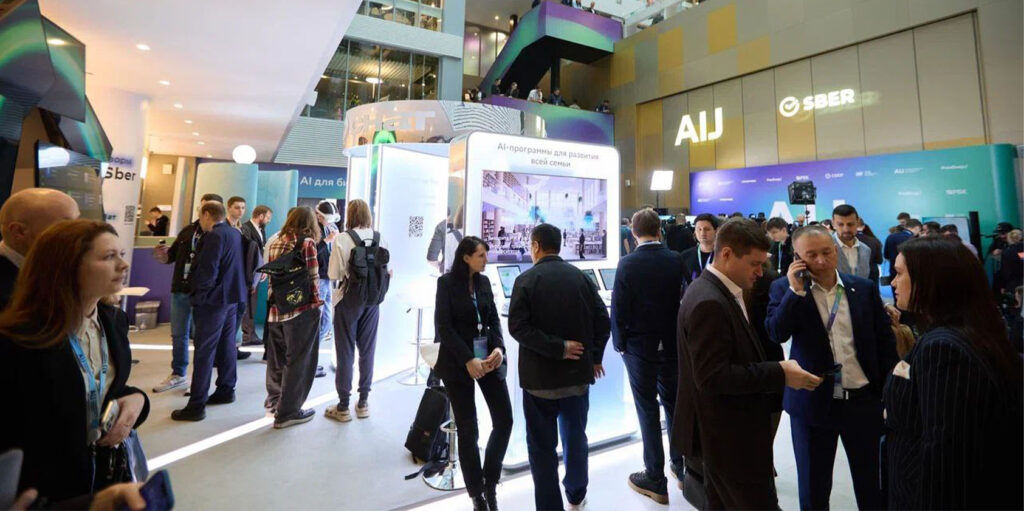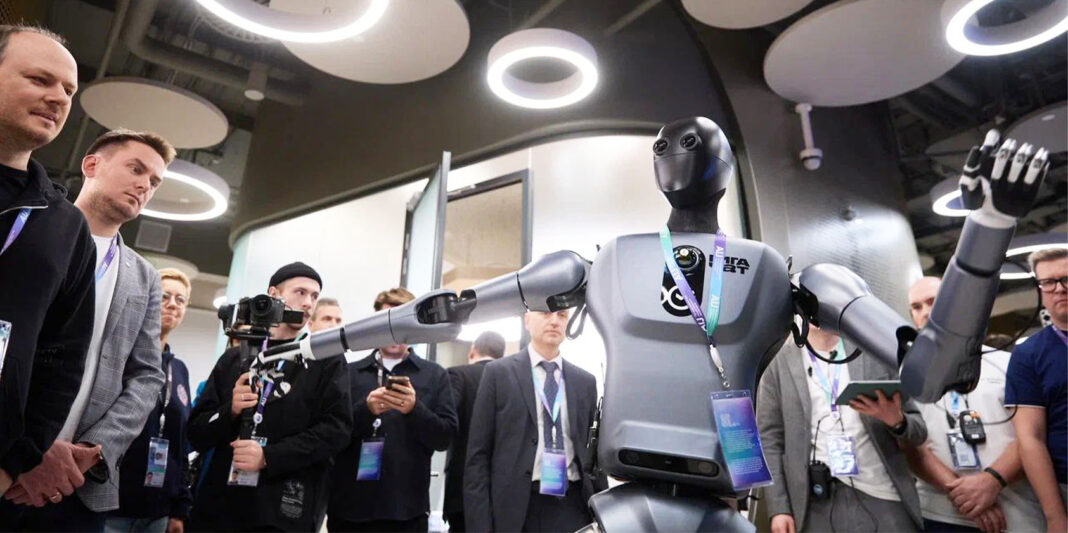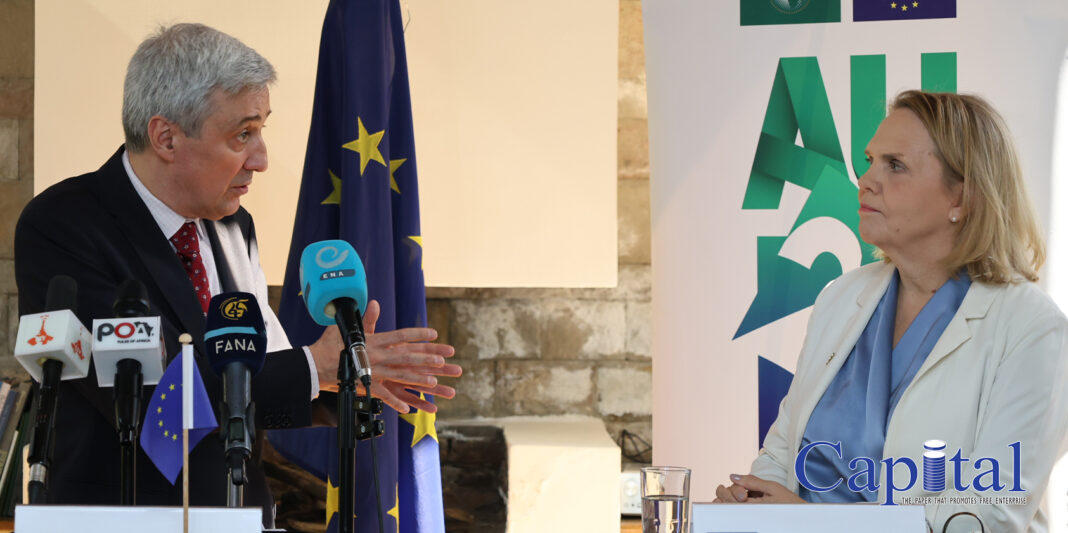By our staff reporter
The three-day AI Journey conference has concluded in Moscow. This major global AI-focused event has brought together thousands of professionals from Russia, China, India, Serbia, Brazil, Bahrain, USA, Malaysia, and other countries, along with millions of viewers worldwide following the event online.
Each day of the conference, marking its 10th edition this year, had a distinct theme. Day one focused on the application of generative artificial intelligence (GenAI) in everyday life and its implications for national development.
The highlight of the first day was the Future with AI discussion moderated by Sberbank’s CEO and Chairman of the Executive Board Herman Gref and featuring Russian President Vladimir Putin. Vladimir Putin expressed gratitude to Sberbank and the AI Alliance for their relentless pursuit of the values of progress and efforts to unite the state, business, and academia around technological advancement. He emphasized that AI had made an enormous leap in recent years, acquiring autonomy in decision-making. These technologies have become strategically pivotal, with leading nations competing for ownership of fundamental AI models. The development of AI ranks among the greatest technological endeavors in history.

Herman Gref emphasized that AI will transform every facet of life, from health and science to education, economy, and industry. “We are very rapidly entering a fundamentally new era of human existence. The Industrial Revolution lasted 200 years, while this revolution will be 10 times faster. It is our responsibility to help people smoothly transition into this new era without shocks and stresses. We will do everything to ensure the development of technology and the competitiveness of our country. I thank all members of the AI Alliance Network for their willingness to cooperate in developing the key technology of this century.”
Day two of the conference spotlighted AI applications across various economic sectors and business processes. Andrey Belevtsev, senior vice president and head of Technological Development at Sberbank, discussed market trends and new company developments. He demonstrated the expanded capabilities of Sber’s large language model GigaChat and announced the release of weights for its newer versions, as well as image-generation and video-generation models Kandinsky 5.0—the largest open source project in Europe.
The spotlight of the second day went to the appearance of the first anthropomorphic robot based on GigaChat. This marked a new chapter in domestic robotics and Physical AI, extending beyond electronic gadgets (smart speakers, TVs, mobile apps) to aid humans in performing physical tasks in the real world. Equipped with 10 sensors processing visual input, inertial sensors, and force sensors ensuring balance and precision, the robot can navigate unfamiliar surroundings and even dance. Its voice-interaction capability merits special attention. Sber intends to pilot projects integrating the robot into various business processes to expand its practical utility in the near future.
Chen Qiufan, in his presentation “The Future of AI: From Fiction to Reality,” highlighted the role of science fiction as a powerful tool for contemplating the future and overcoming the limitations of linear thinking. Classic Sci-Fi authors, such as Karel Čapek and Isaac Asimov, accurately predicted modern-day issues, from protests against automation to ethical dilemmas surrounding AI interaction, primarily the discrepancy between human and machine goals. While predicting technological development, we often err in the details but prove correct regarding human reactions. Hence, the main danger arises not from AI itself but from the behavioral models we embed within it. Therefore, the key question is not “how to build the best AI?” but “how can we improve ourselves?” since technologies merely reflect who we are.
Another significant event of the day was the second international business forum on AI for BRICS+ countries, where Alexander Vedyakhin presented AI Success Hub, an international platform for AI use cases in BRICS+ countries and partners. The platform features around 80 AI use cases from nearly 30 countries.
The second day also hosted a session of AI Alliance Russia, followed by an awards ceremony honoring the recipients of the national AI Leaders prize for contributions to the advancement of artificial intelligence.

On the same day, the special in-person track AIJ Deep Dive opened. The track’s program included presentations by leading AI experts from Russia and around the world, talks by research centers sharing groundbreaking scientific articles, pitch sessions by prominent Russian AI startups, and demonstrations of business solutions based on GenAI and multi-agent approaches.
The third day, dedicated to AI in science, began with Deputy Prime Minister Dmitry Chernyshenko and Andrey Belevtsev. Dmitry Chernyshenko emphasized that competition for computational power, energy, and the ability to train fundamental models is intensifying, while Russia advocates for collaborative work among scientists from different countries to advance humanity as a whole. He noted that this year, at the initiative of Sber under the auspices of the International AI Alliance, the international foresight AI Horizons was organized. This work brought together scientists from 36 countries who, over 25 sessions, identified 10 key directions for developing the main technology of the 21st century. The created foundation will enable Russia to achieve breakthroughs, including in the development of artificial general intelligence.
On the third day of the conference, scientists from around the world shared hands-on experience in developing AI solutions for various tasks. Nebojša Bačanin Jakula, vice rector for scientific research at Singidunum University, Serbia, discussed the achievements of bio-inspired metaheuristics. According to him, the convergence of machine learning and metaheuristics opens new horizons for large language and diffusion models. Federated machine learning enables training models on decentralized data. The speaker emphasized that the transparency of bio-inspired algorithms attests to their reliability, while the development of quantum metaheuristics contributes to creating greener computing with a reduced carbon footprint. Metaheuristics can optimize coordination in multi-agent systems for robotics and logistics, reducing costs by up to 30%. By 2030, the advent of self-adaptive algorithms will make AI ecosystems more adaptive, enabling them to address global challenges, the researcher is convinced.
The Science Day at AIJ hosted a unique youth track, AIJ Junior. Russian experts shared practical tips on using AI solutions for studying, creativity, and self-development. Winners of international Olympiads in artificial intelligence and exact sciences gave interviews, inspiring young audiences to explore new opportunities for growth in this field.
The conference concluded with the awarding of prizes to the winners of AI Challenge, a contest for young data researchers, and the AIJ Contest for experienced AI specialists. The results of the open selection of scientific papers for AIJ Science were also announced. The best works will be included in a scientific journal jointly published with the Russian Academy of Sciences, and the best article will be awarded a monetary reward.







